

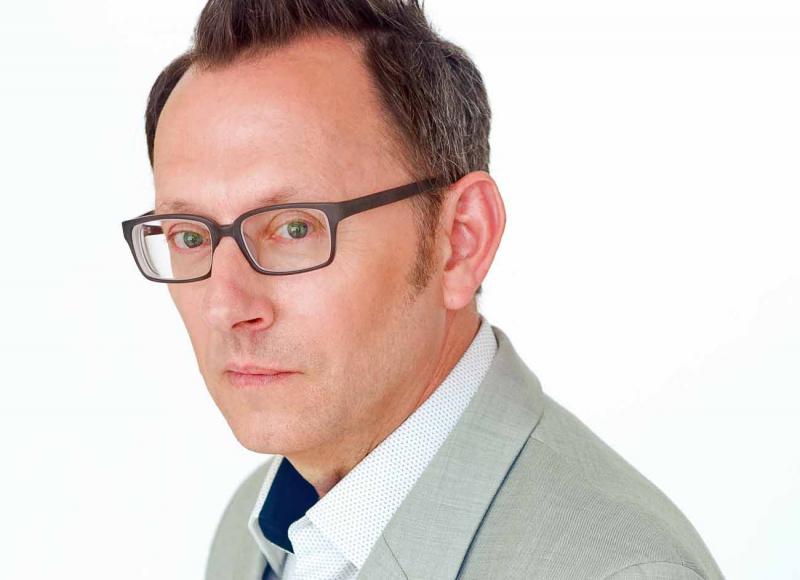
He may not be a household name, but Michael Emerson became a household face by virtue of his role as the sinister Benjamin Linus in Lost, the leader of the group called the Others on the show’s hallucinatory South Pacific island. Emerson, born in Cedar Rapids, Iowa in 1954, was already a theatre veteran with a string of intermittent TV performances to his credit.
Lost ended in 2010, leaving even faithful viewers bewildered by its mystical and metaphorical ending, but the following year Emerson was cast as the enigmatic billionaire Harold Finch in the mystery-drama series, Person of Interest. It was created by screenwriter Jonathan (aka Jonah) Nolan, collaborator/brother of film director Christopher [3], and like Lost, the series is made by JJ Abrams's Bad Robot production company. Not a bad pedigree, since Abrams's entertainment juggernaut has also launched Alias, Fringe, Undercovers and Alcatraz on TV, and the movies Cloverfield, Star Trek, Super 8 and Mission: Impossible - Ghost Protocol. The preposterously over-achieving Abrams is now about to direct Star Wars: Episode VII.
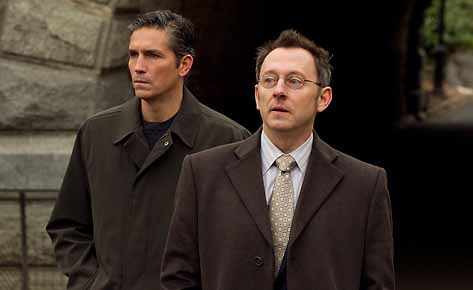 After a relatively slow start in the US, where it airs on CBS, Person of Interest has suddenly boomed in its second series, and now ranks in America's top five shows. Season two is currently showing in the UK on Channel 5 on Sunday nights, where it may not topple the likes of Mr Selfridge [4] and Call the Midwife [5], but is pulling a million-plus viewers and rising.
After a relatively slow start in the US, where it airs on CBS, Person of Interest has suddenly boomed in its second series, and now ranks in America's top five shows. Season two is currently showing in the UK on Channel 5 on Sunday nights, where it may not topple the likes of Mr Selfridge [4] and Call the Midwife [5], but is pulling a million-plus viewers and rising.
The show centres around the eccentric relationship between Emerson's Finch and Jim Caviezel [6]'s John Reese (pictured above with Emerson), a former CIA agent who had suffered a psychological crack-up following the death of his lover, and was living as a hobo in New York. Finch has devised a computer system for the government called The Machine, able to hoover up data from all manner of surveillance sources to predict terrorist attacks. However, Finch found that it could predict "ordinary" crimes too, though it could only identify an unnamed "person of interest" who was involved, without specifying whether they're perpetrator or victim. Finch rescued the burned-out Reese from the gutter, and now sends him out as investigator and enforcer on Machine-specified missions...
ADAM SWEETING: What was your first glimpse of Person of Interest?
MICHAEL EMERSON: I read a pilot script. It was sitting on JJ Abrams's desk. Terry O'Quinn [from Lost] and I had been trying to cook up some kind of project together because we get along so well, and nothing was quite clicking. I thought come on, this is Bad Robot, and I said "what have you got?" So they gave me this thing that Jonah Nolan had written, and I thought it was exciting and I liked the high-tech, high styleness of it and its noir quality. And the fact that it was set in New York City was really appealing, though right now I'm feeling like it's a bad bargain weather-wise because it's been really a cold snowy winter here and we shoot outdoors quite a bit, so the work has been kind of tough and bone-chilling lately. I guess I was spoiled by the climate in Hawaii [for Lost], but really the island I prefer is the island of Manhattan.
Is JJ Abrams very hands-on?
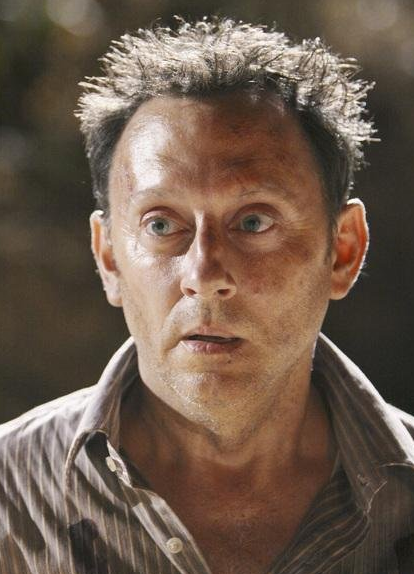 No, I think JJ's role in this particular case was to be the sort of broker or bringer together of the artistic parties. I think he has bigger projects that take most of his attention. But it feels like a Bad Robot show and I'm happy to be part of what seems to be a kind of repertory company of actors who work on JJ's projects. I just like the stuff he picks. There's always an element of mystery or the thing untold or the black box into which we cannot see, and I share that feeling with him. That's where there are some similarities between Lost and Person of Interest (Emerson in Lost, pictured above). Like all Bad Robot shows it bounces around in time a little bit, it has some central questions that will never be answered, there's an air of mystery about it. Jonah tried to create a state of paranoia where no-one can be trusted which includes the conventional authorities, although we do have good cops and bad cops.
No, I think JJ's role in this particular case was to be the sort of broker or bringer together of the artistic parties. I think he has bigger projects that take most of his attention. But it feels like a Bad Robot show and I'm happy to be part of what seems to be a kind of repertory company of actors who work on JJ's projects. I just like the stuff he picks. There's always an element of mystery or the thing untold or the black box into which we cannot see, and I share that feeling with him. That's where there are some similarities between Lost and Person of Interest (Emerson in Lost, pictured above). Like all Bad Robot shows it bounces around in time a little bit, it has some central questions that will never be answered, there's an air of mystery about it. Jonah tried to create a state of paranoia where no-one can be trusted which includes the conventional authorities, although we do have good cops and bad cops.
When I got on Lost I came in the middle of series two, and I think they had peaked in terms of viewership. It was never the same again after the first season, but those who stayed with the show were more fanatical than any TV viewers I've been around. I think half the people that talk to me on the street now are still watching Lost, maybe they got the box set. Everyone wants to take you to task for the ending. Finally I met someone the other day who said "I just want to tell you I think the ending was beautiful", and I said "well thank you for that, I'm glad I didn't have to make my pitch."
Surveillance, Kevin Spacey and the ancient Greeks, overleaf [7]
Do you get much latitude to play around with the Finch character?
I think it was there on paper, the mysterious billionaire tech-head. They've fleshed it out a good deal since then. I mean you do that, that's a collaboration between whoever plays it and whoever writes it, and I think we've come up with a balance. I don't think they thought he would have as much dry wit as he does now, or maybe I just imagined it. I always think I'm in a comedy. There is a kind of gallows humour between Reese and Finch. They're two guys who are just about to jump off the cliff, but they trade a good line before they make the leap. We have some fun along the way. I mean we have a dog now, funny things happen!
The stage is thrilling and terrifying and I suppose a little addictive on some level
Does the idea of Finch's super-surveillance system, The Machine, frighten you at all?
Well part of me wants to say "I'm a law-abiding citizen, it will never be brought to bear against me" and yet you see the potential for it. I don't suppose there are many human or technological systems that cannot be corrupted in some way or misused or abused, so I'm a little more conscious of the relentless surveillance - well, you know this from living in London. I'm conscious of cameras everywhere, and I'm conscious that my cellphone which I carry with me everywhere throughout my day is also a microphone and a tracking device and all of that stuff, so it does give you pause. In the show I think we are good guys, although we're kind of vigilantes. We certainly work outside the bounds of the law, but that's a great American fictional trope I guess, the vigilante do-gooders, the Lone Ranger, that kind of thing. It's a bit like Batman [8]. We have a kind of dynamic duo, although not very dynamic in my case, but there's a warrior and an enabler. We work secretly, privately, off the grid. It's kind of a classic formula.
Did you base Finch on any particular models?
No. I looked at videos of big computer guys like Steve Jobs [9] giving symposia and such, but there wasn't anything for me to use. These were men who were kind of quiet and undemonstrative, there just wasn't a lot of character juice in it, so I had to fall back on my own resources. In the pilot script it said something about him being "damaged in mind and body", something like that. He had to be handicapped. I should say that the first pilot script I read was maybe a darker affair than the show has turned out to be. It was more desperate, the mission was more suicidal.
 I knew that Finch had to have a physical infirmity and I had to come up with it quick, because whatever you do in the pilot, that must be it forever. So I tried to come up with something that looked like a plausible handicap but would not be too hard on me physically. I didn't want to end up needing physical therapy because of a crazy position that I was doing on the show, and I came up with the limp. But it's working out alright. In Times Square the other day a guy ran up to me and said "Mister, you just won me a hundred bucks," because he had a bet that I wasn't really crippled. And you want to say "have you never seen me on TV before? What about the flashbacks when I'm normal? Is that likely the act of a crippled actor, putting on a normal walk?"
I knew that Finch had to have a physical infirmity and I had to come up with it quick, because whatever you do in the pilot, that must be it forever. So I tried to come up with something that looked like a plausible handicap but would not be too hard on me physically. I didn't want to end up needing physical therapy because of a crazy position that I was doing on the show, and I came up with the limp. But it's working out alright. In Times Square the other day a guy ran up to me and said "Mister, you just won me a hundred bucks," because he had a bet that I wasn't really crippled. And you want to say "have you never seen me on TV before? What about the flashbacks when I'm normal? Is that likely the act of a crippled actor, putting on a normal walk?"
Do you feel typecast as an odd and rather menacing sort of person?
Well I think that's what I played for a while. It would have been hard not to play it because my first big TV part was the scariest one that I'll ever do I'm sure, the serial killer William Hinks in The Practice [this performance won Emerson his first Emmy in 2001], so I'm gradually working my way back into the warmer, fuzzier part of the spectrum. But it’s surprising to me that I’ve become associated with work on the mainstream American networks, because I'm a kind of eccentric actor and certainly not a poster boy or a fashion plate or anything. You would think that I would end up on a more niche network on cable or something, and I wouldn’t ever have suggested that I would be on a big network procedural, but here I am. It's all just fate isn't it, the things that land on your plate and the things you pursue and whether you're successful with them or not. Anyway, Person... is a good show for CBS, which is the oldest and most conservative of the big networks here. Their business model is a strong one but a slightly conservative one, and they do like shows to have standalone episodes, so the viewer can get it whenever they stumble upon it. It helps later on when they need to do reruns, syndication sales, that kind of thing. But I think Jonah Nolan is balancing CBS's format needs very well with his own interest in a narrative that goes all over place (the dynamic duo with Taraji P Henson as Detective Joss Carter, pictured below).
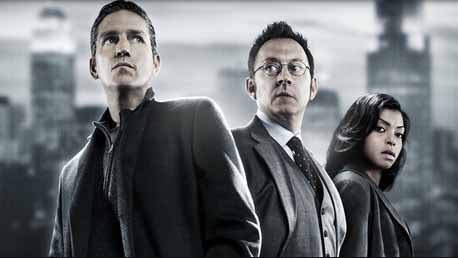 You've had an extensive background in theatre, including a lot of Shakespeare [10]. Can you use your full range of acting skills on TV?
You've had an extensive background in theatre, including a lot of Shakespeare [10]. Can you use your full range of acting skills on TV?
Yeah, in miniature I'd say. The amplitude never gets to be turned up very high, I don't get to chew up the scenery the way I used to onstage, but the camera does the chewing for me I guess. I really feel like I get to do all the things I used to do, the same choices, the same reliance on the power of language. All those things that I value, I think they're still in play. They're just played more minutely and closer to the vest. I think we're living through what I'd call a second golden age of TV and I think it's down to the writing or choice of material. There are so many compelling TV series now and not quite so many compelling films. Or the film industry has changed and it's become more blockbuster driven, there's less room for more marginal or smaller movies of interest to grown-ups, for want of a better word.
You appeared on Broadway with Kevin Spacey [11] in The Iceman Cometh?
Yes, it came here from the Old Vic in London. I think American Equity required that they use a certain number of New York actors so I got quite a delicious role in it [Willie Oban] and it was good fun, and my Broadway debut. It was thrilling to be in a big old warhorse of a play like that on Broadway. Y'know, you're part of a chain with links that go all the way back into the dim past so it was very exciting. I'll never forget it. But oh man, that's a long play - four and a half hours.
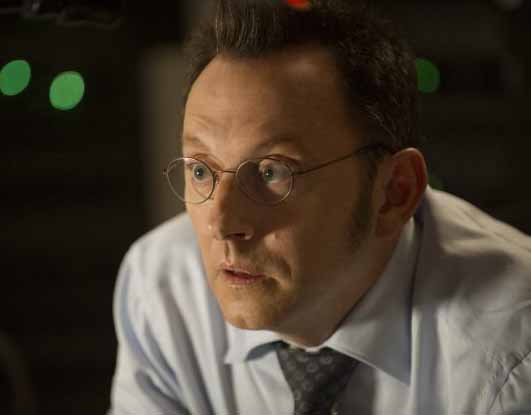 Is your heart in stage work, or do you aim to keep a balance with TV?
Is your heart in stage work, or do you aim to keep a balance with TV?
I think an actor that wishes to make a living these days should figure out how to live in both worlds. You can't dictate it. I think it's just important to be ready for whatever comes your way and have the right toolkit for it. I love the stage because it's where I learned to act and I love the habits and the history of it, the rituals of it, the kind of magic hour quality of it, and the great leap off the cliff when it's curtain up and you go out there and there's no turning back. That's kind of thrilling and terrifying at the same time and I suppose it's a little addictive on some level. I'm happy to work and make a living now having spent so many years paying my dues onstage, but I will be anxious to go back to it, some time soon I hope.
I read that you have an interest in the ancient Greeks?
I do like the Greeks, oh yeah. I just like the stakes and the scale of the Greek tragedies [12] and the kind of essential poetry of the writing. I think it's so highly distilled that we still care about those stories and the way they're told after 2,500 years. It's a remarkable conversation with the ancients, in a way. That's why I like the theatre so much, because as soon as you sit down in that dark room it might just as well be Athens as Broadway. You've come together in a space for a lesson, or an argument.
Links
[1] https://theartsdesk.com/users/adam-sweeting
[2] https://www.addtoany.com/share_save
[3] http://www.theartsdesk.com/film/inception
[4] http://www.theartsdesk.com/tv/mr-selfridge-itv1
[5] http://www.theartsdesk.com/tv/call-midwife-series-two-bbc-one
[6] http://www.theartsdesk.com/tv/prisoner-itv1
[7] https://theartsdesk.com/tv/10-questions-actor-michael-emerson?page=0,1
[8] http://www.theartsdesk.com/film/dark-knight-rises-0
[9] http://www.theartsdesk.com/tv/steve-jobs-billion-dollar-hippy-bbc-two
[10] http://www.theartsdesk.com/search/node/shakespeare
[11] http://www.theartsdesk.com/theatre/richard-iii-old-vic
[12] http://www.theartsdesk.com/opera/medea-english-national-opera
[13] http://www.channel5.com/shows/person-of-interest/episodes/blue-code
[14] https://theartsdesk.com/node/47717/view
[15] https://theartsdesk.com/node/339/view
[16] https://theartsdesk.com/node/19454/view
[17] https://theartsdesk.com/node/20321/view
[18] https://theartsdesk.com/tv
[19] https://theartsdesk.com/topics/new-york
[20] https://theartsdesk.com/topics/tv-drama
[21] https://theartsdesk.com/topics/features